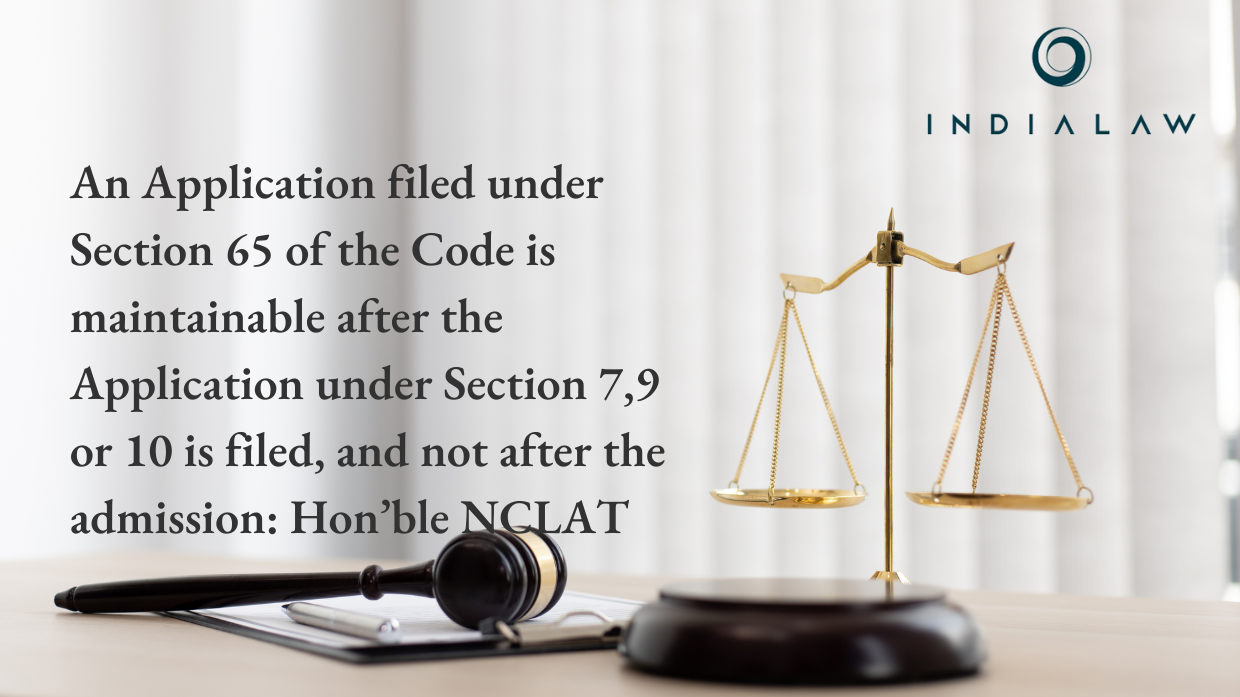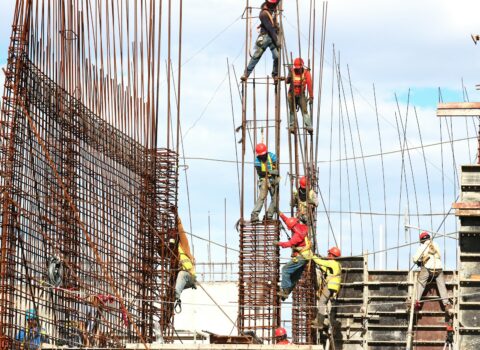An Application filed under Section 65 of the Code is maintainable after the Applications under Section 7,9 or 10 are filed, and not necessarily only after admission: Hon’ble NCLAT, New Delhi

Introduction:
The Hon’ble NCLAT in a significant ruling, recently addressed a crucial issue in insolvency jurisprudence vide its Order dated 05.08.2024 in the matter of Devashree Developers Pvt. Ltd. and Ors. vs Aravali Cylinders Pvt. Ltd.[i] The case delves into the admissibility of an Application under Section 65 of the Insolvency and Bankruptcy Code (IBC) when filed prior to the admission of an application made under Section 7 of the Code.
Facts of the Case:
The main contention in this issue arose from an Application which was jointly filed by the shareholders of Aravali Cylinders Private Limited the Corporate Debtor under Section 60 (5), 65 and 75 of the IBC. The Order passed by the Hon’ble NCLT on 29.08.2023, dismissed the Application filed under Section 60 (5), 65 and 75 of the IBC, stating that the Application had been filed prematurely. The Tribunal further held that an Application filed under section 65 of the IBC could only be considered after admission of the Company Petition filed under Section 7 of the IBC, which initiates the Corporate Insolvency Resolution Process of the Corporate Debtor.
Analysis of the Decision:
The fundamental question that the appeal sought to address was whether an Application made under Section 65 of the Code is maintainable before or only after the admission of an Application filed under section 7 of the Code initiating the CIRP proceedings.
The National Company Law Tribunal (NCLAT) decision was based on a detailed and thorough examination of both procedural and substantive aspects of the provisions of the IBC which were further in turn supported by an analysis of important judicial precedents.
One of the judgements that the Hon’ble Tribunal referred to in answering the question at hand was the judgement delivered by the Apex Court in Beacon Trusteeship Limited vs. Earthcon Infracon Pvt. Ltd., 2020 SCC OnLine SC 1233[ii]. The Supreme Court in this case addressed the issue of collusion and malicious initiation of insolvency proceedings. The Hon’ble SC also laid emphasis on examining and addressing appropriately the allegations of fraud and collusion. It was categorically stated that the issues surrounding collusion could not have been raised for the first time on appeal before the NCLAT or the Apex court and must be thus addressed by the NCLT based on the Applicational filed.
The NCLAT also relied upon another landmark case before it in the case of Ashmeet Singh Bhatia vs. Sundram Consultants Pvt. Ltd., 2023 SCC OnLine NCLAT 1423[iii] which clarified and stated that applications made under Section 65 of the IBC are maintainable once the primary application made under sections 7, 9 or 10 of the Code are filed and not necessarily after the admission. The interpretation of the NCLT that such applications are only maintainable or can be made post admission was deemed to be incorrect and erroneous.
The Appellate Tribunal was of the view that the NCLT had committed a significant error in dismissing and setting aside the Application solely upon procedural grounds without examining its substantive merit. This was deemed to be completely in contrast with the established legal principles laid down in legal precedents and substantive aspects of the provisions of the Code, which called for a thorough investigation into allegations of fraudulent or malicious intention behind initiation of insolvency proceedings.
The NCLAT thus allowed the appeal by setting aside the impugned order and restored the application filed under Section 65 of the Code. The Application was further remanded back to the NCLT for adjudication in accordance with law.
This decision reaffirms that applications made under Section 65 of the Code, which challenge insolvency proceedings initiated with fraudulent or malicious intentions, can be filed as soon as applications seeking to initiate CIRP proceedings are filed, and not necessarily only after admission.
[i] (2024) ibclaw.in 475 NCLAT
[ii] Beacon Trusteeship Limited vs. Earthcon Infracon Pvt. Ltd., 2020 SCC Online SC 1233
[iii] Ashmeet Singh Bhatia vs. Sundram Consultants Pvt. Ltd., 2023 SCC Online NCLAT 1423
By entering the email address you agree to our Privacy Policy.



